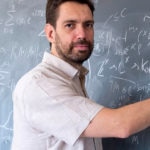Spanish mathematicians look for a model to predict how the pandemic will evolve
The mathematical community has committed all its resources to support the fight against COVID-19. Specifically, the Spanish Mathematics Committee (CEMat) has launched Mathematical Action against Coronavirus, an initiative geared towards putting the Committee’s analysis and modeling capabilities at the service of authorities to help them better understand the problem and design possible solutions. David Gómez-Ullate and Justo Puerto, both recipients of several BBVA Foundation grants and scholarships, are two of the mathematicians who are contributing to the project.

Predicting how the virus will evolve is essential, more so given the lack of knowledge about its behavior and its rapid expansion. Since the outbreak of the coronavirus, the World Health Organization (WHO) has been using mathematical models to try to estimate its risk. Although the use of this type of tools is by no means rare in these cases, their reliability depends on the degree of knowledge available about the system they intend to simulate. That is why it is essential to gather as much information as possible about the variables that impact the virus’ evolution.
Data collection is essential to make reliable predictions. Without data, models just don’t work, says David Gómez-Ullate, one of the ten members of the Action’s Expert Committee. In 2015 the BBVA Foundation awarded a Leonardo Grant to the mathematician to develop a research project to explore uses of use artificial intelligence and data science to develop fraud detection applications in payment methods. Gómez-Ullate was also a member in one of the teams awarded by the BBVA Foundation's Ayuda a Equipos program. His team’s proposal was exploring uses of AI to debunk fake news.
Model reliability depends on data
The data are out there, but "you have to be able to find them, wherever that may be," says Gómez-Ullate. With all these data obtained in an isolated manner, his job now is to classify them and "create a sort of meta-model working collectively," he explains. In addition, he underlines the importance of mobility data collected by mobile devices to model progressive confinement phase-out procedures: “Authorities must provide access to these data to research teams capable of interpreting and using the available information in models that support decision making.”

David Gómez-Ullate, mathematician awarded with a Leonardo Grant - BBVA Foundation
We want to be able to predict as reliably as possible how the pandemic may evolve in each autonomous community, to contribute to making sure we can start lifting confinement measures minimizing the chances of a rebound, says Justo Puerto, winner of a BBVA Foundation Team Grant in Big Data. His team will focus on developing algorithms to improve the applicability of data science to real life problems, such as planning logistics operations, pattern recognition in social networks or finance.
This specialty he is already working on could help speed up the pace of post-pandemic recovery. “It will be necessary to respond to significant challenges in the management of many logistics networks, which opens up another broad field of involvement for experts in Optimization and Data Science,” he explains.